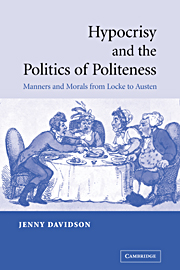Book contents
- Frontmatter
- Contents
- Acknowledgments
- Introduction: The revolution in manners in eighteenth-century prose
- 1 Hypocrisy and the servant problem
- 2 Gallantry, adultery and the principles of politeness
- 3 Revolutions in female manners
- 4 Hypocrisy and the novel I: Pamela, or Virtue Rewarded
- 5 Hypocrisy and the novel II: a modest question about Mansfield Park
- Coda: Politeness and its costs
- Notes
- Bibliography
- Index
4 - Hypocrisy and the novel I: Pamela, or Virtue Rewarded
Published online by Cambridge University Press: 22 September 2009
- Frontmatter
- Contents
- Acknowledgments
- Introduction: The revolution in manners in eighteenth-century prose
- 1 Hypocrisy and the servant problem
- 2 Gallantry, adultery and the principles of politeness
- 3 Revolutions in female manners
- 4 Hypocrisy and the novel I: Pamela, or Virtue Rewarded
- 5 Hypocrisy and the novel II: a modest question about Mansfield Park
- Coda: Politeness and its costs
- Notes
- Bibliography
- Index
Summary
In a letter of 20 October 1755, Lady Mary Wortley Montagu writes with disapproval of Richardson's latest heroine that Harriet Byron “follows the Maxim of Clarissa, of declaring all she thinks to all the people she sees, without refflecting [sic] that in this Mortal state of Imperfection Fig leaves are as necessary for our Minds as our Bodies, and tis as indecent to shew all we think as all we have.” Montagu's objection to Sir Charles Grandison hinges on the question of whether it is wise to promote a rhetoric of transparency when decency in social interactions depends on concealment. Is the openness of Richardson's (usually female) first-person narrators sincere and principled, as Richardson and his supporters assert, or obscene and manipulative, as his detractors charge? Both Clarissa (1747–48) and Grandison (1753–54) were written in part to refute the accusations of readers who had singled out in Richardson's first novel Pamela (1740–41) what they perceived as technical and moral crudities, identifying Pamela herself as a hypocrite, and the Pamela controversy of the early 1740s offers eighteenth-century Britain's most fully worked-out debate on the problem of hypocrisy.
Many of Richardson's readers found it impossible to separate their doubts about Pamela's sexual integrity from those about her rhetorical integrity, and I will approach Pamela as an experiment in which Richardson explores the rhetorical risks and payoffs of writing an epistolary fiction in which the personal safety of the primary letter-writer depends on her being able to persuade readers within the world of the novel that she is not a hypocrite.
- Type
- Chapter
- Information
- Hypocrisy and the Politics of PolitenessManners and Morals from Locke to Austen, pp. 108 - 145Publisher: Cambridge University PressPrint publication year: 2004

